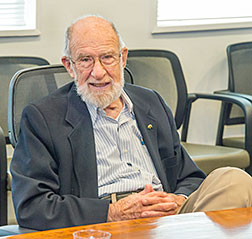- Number 406 |
- February 3, 2014
Andrew Sessler: Fermi Award-winning scientist and champion of humanitarian causes

Andrew Sessler
“I like to think that many physicists look up, on occasion, from their experimental apparatus or computer screen, to see that all is not well with the world, and devote some time and effort to help.”
Andrew Sessler, 85, former director of DOE's Berkeley Lab (1973-1980), made that statement in 1994 when he became the first recipient of the American Physical Society’s Dwight Nicholson Medal for Humanitarian Service. Sessler received the Nicholson Medal for being a co-founder of the human rights group Scientists for Sakharov, Orlov and Sharansky (SOS), scientists who were persecuted as dissidents in what was then the Soviet Union.
Earlier this month Sessler was named by President Obama as a recipient of the Enrico Fermi Award, the DOE administered award that is the federal government’s oldest and most prestigious prizes for scientific achievement. Sessler was recognized for his ground-breaking work in particle-beam physics. However, his contributions to the nation and the world have always extended well beyond theoretical physics.
“The struggle for human rights is an eternal one,” Sessler has said and he has acted upon those words. In addition to his leadership of SOS, Sessler has played prominent roles on the Committee of Concerned Scientists, Amnesty International, and the National Academy of Sciences Board of Radiation Effects Research, which, among other projects, tracked the long-term effects of radiation on American soldiers exposed during the testing of nuclear weapons in the 1950s. He also lead one of the first international studies on the detection, disarming and removal of landmines.
Not only has Sessler long been an out-spoken champion of humanitarian causes, he was also among the first scientific leaders to become a public advocate for environmental and alternative energy research. In 1973, when he became director of what is now Berkeley Lab, the infamous oil embargo has just gotten underway. Gas prices soared and gas station lines extended for several blocks. In response, Sessler’s first action as laboratory director was to establish a scientific research division dedicated to energy and the environment.
“I’d always loved the outdoors, and preserving the environment was a big concern,” says Sessler, an avid backpacker, skier and bicycle rider. “Seeing that the United States was developing a national energy plan, I knew we were one of the few places in the country at that time with the scientific expertise to help.”
Said the current Berkeley Lab director Paul Alivisatos on hearing about Sessler’s winning the Fermi Award, “Andy Sessler changed the face and character of Berkeley Lab. He successfully made the case for science to aid our country during its first energy crisis and helped establish the Lab's efforts that brought about important technologies and standards that have improved the way we conserve and consume energy.”
For all of Sessler’s efforts for humanitarian and environmental causes, however, he has never lost focus on his science. The Fermi Award cites his “outstanding contributions to the establishment of the beam-physics knowledge basis that has underpinned the development of current-generation particle accelerators and storage rings deployed at leading research institutions throughout the world.”
These contributions began in the 1950s with foundational work in particle accelerators that provided the basis for today’s particle colliders, synchrotron light sources and free-electron lasers. In addition, he was among the first to report on stochastic phenomena, or chaos, in particle accelerators.
“I was very fortunate to be a theoretical physicist in the early years of particle accelerators,” Sessler says. “We were able to apply theory to single and multiple particles effects in beams, which taught us how to obtain the intense beams necessary for colliders, synchrotron light sources and free-electron lasers.”
Sessler is scheduled to receive the Fermi Award at a ceremony in Washington, D.C., on February 3.Submitted by DOE's Lawrence Berkeley National Laboratory
